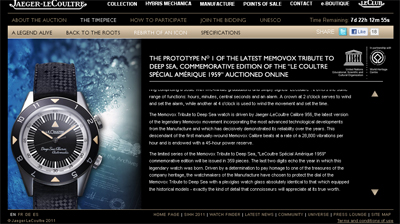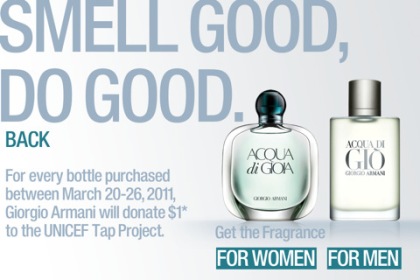PALM BEACH, FL – Participating in philanthropic or altruistic efforts is a powerful differentiator for luxury brands because it makes consumers more connected to them, according to a speaker at American Express Publishing’s Luxury Summit 2012.
Not only are consumers more likely to buy products or services from luxury brands that participate in philanthropy, some do not trust or even boycott brands that seem altruistically irresponsible. Also, there is the fact that consumers can feel good about themselves and the products they buy by aligning with causes that share the values of the brand and of its customers.
“Giving back feels good,” said Trevor Neilson, president of Global Philanthropy Group, Los Angeles. “We are biologically programmed to feel good when we do good.
“Smart companies are understanding that altruism can be a powerful way of differentiating their brands and beating competition by showing luxury consumer sin particular that they understand that, in a certain way, philanthropy is the ultimate luxury,” he said.
CSR for CRM
Consumers are more likely to buy from a brand if they participate in philanthropic efforts.
In fact, 94 percent of consumers report that they would switch to a brand that supports a cause.
In addition, 20 percent would buy a more expensive product if it supported a cause.

Jaeger-LeCoultre's watch auction site
Consumers are now expecting that luxury brands affiliate themselves with a specific cause.
However, this only works if a brand and its cause are related.
The old model of philanthropy was reactive, mostly in an executive’s interests and was done because it was the right thing to do, Mr. Neilson said. Indeed, back then, brands had limited interest in what they were doing.
However, a new model has been introduced. This is all about being proactive, including issues that are aligned with interests of customers, communicating and measuring impact and, ultimately, communicating back to consumers.
Affluent altruism
Many luxury brands are already participating in causes that align with their own core values as well as those with their customers.
For example, Bulgari’s sale of one of its rings helped the Save the Children foundation.
The brand increased advocacy through key celebrity relationships and online presence and held high-profile fundraising events in Rome and New York.
These efforts helped build Bulgari as a leader in promoting philanthropy as the pinnacle of luxury, Mr. Neilson said.
Other luxury brands are turning to philanthropy -- and to good effect.
For example, Giorgio Armani is donating drinking water to third-world countries for every consumer who buys its Acqua di Gio or Acqua di Gioia fragrance (see story).

Armani's Acqua for Life campaign
Also, Swiss watchmaker Jaeger-LeCoultre, which began its fourth annual auction to benefit the UNESCO World Heritage Marine Program, let consumers bid on a prototype N°1 of the Deep Sea Vintage Chronograph (see story).
In addition, fellow Swiss watchmaker Breitling is looking to increase the awareness of its Breitling Scholars program and raise funds for education through the auction of a collectible timepiece (see story).
Luxury brands typically use charity-related marketing because it makes consumers feel better about buying.
In fact, luxury marketers host events or team-up with charities to create a halo effect around themselves, and some experts believe that affluent consumers respond quite well to this strategy (see story).
Brands are also better off showing off their affiliations, Mr. Neilson said.
“Brands have a bigger opportunity to address the world than individuals do, even if they are celebrities,” Mr. Neilson said.
“Brands that do not talk about their altruism have a really old-fashioned approach,” he said. “You are insane to hide your work, because if you actively promote it as a part of who you are, consumers are going to respond in a positive way.”
{"ct":"R1z++VY2hNbYawVuMVuGdvadYRJrlzNO4cfCzMl6O+Na8DiBddk95R9WSjbP9NZsSFQDMUn0Zw9cKvFSigI3H6S\/FmfGXl6FP4FfYfufyRWLbQMZy3D+4B8tHOWai\/UjMvnDtLLsG9Pv5C6ElWOosp32XS2rB+Be6kRG5FCjHFYJW7FpYWXemLH3JhFQcwxfk9RQhY+zDsp55HxJFoV1tgCmipu0c9ryiJNf6IsR2vWZjvSerl4aj+H4AFP2EcpVWkCuVVefnyYXr5ovJxGPmrnTHAAPX\/l+hWwY92brbSnm8RUbtFjLmqqfp0D3bM2l6KXv42xiVm+wewmZFITpI+oYVqpI14E5nne2jEN+UVQRdjk8+smIj8qzoQe95fP7QXvzm1IQM9AtYUYI5ke5bsJW6DKk7mDawRBpUEomR+RHhDdFrw87LVMIok59xoxQrvwaXv51shDBJMh2uaS4uzR02TjBJLE88qhVkgX7lmai86WjB4Hn5pTTH9Gw7GyTARC8vQNDZPkLsi2mIEay3arlnio5aTcRbRGmOSjfEEqhJ348LjjK4Ii1l1toH+xGiAu1vkYNJZhLPznkxTReEaG6lGO1WN+aKFuiGG6qMBpiFyweLHexnh7Jfcn8vOgprTyuk7TLxFrVLxJ\/+oiSOt3vVDmsPcfsH4iflcCUO4vRS0n7OjJtWug3Cy6FnNuHRuDXxdKBu0rtT+Wu+CTZnf9zNC\/TJwEjMOE9ocKd+uAGxlLGCo8btJKdug10\/2a7K\/8qkgZERIZojvRdQF\/fkRsUj32\/IVWx1Teql2KIC5ppU24pUFdLX1\/XPH7vnIiEJXz8GeDslgV5VtCJwdLq1IzMeLE2ke62n434KQ7sujvf+YJVAxfFYXAox8hvsj7byqCTBmn1mTO\/MqsW5VSi+6XV6SdqLUfuThfh62gX8KnHQ9aunD4erhwKzpba5LddGkvi3tLe1EczPVKhx43y05PyRoKo57fNGTsSCH+dXHjtzNZYmN3YuASpV1cJ9EzMZFhmSsPB29T3+An8ZHgnJsI2a5XmuvlK6dZ6CIwQInrYLctkJE1RcZPF3Bfvs9v7HGZDFi7PU3MW\/YZiiFGt1boSWk4SVHkYqe\/dcTA2Z8ThoSGxmlzEo2YZlPbO3y46th4LAJ1eIleVBzRNqhMDomGS+dcOxVOBnUz511L6LAMB2kSF4bu\/b08WYKlK7Oa1ZLLIdIt4mBHKW7RZYW94bLdioHRmvpZQ4xjZ24z4jNBdNT\/E6jt\/KncwalcmQordmnCwQV5xms8EYh\/3T+h0zRoGHo7TrIHfCIxvf7Ib1nIbvBpGUMqJZtIjVdRk5XFE7gRw3H1iNtR4trdEEqyI+L4XFcPCLTmz\/ZhZp59LW7fwoTT2ygXlnh4dv7uoe3oCiHsFtN50DXfqnXSDIwt3qXDae72JSSe1LsXGoNBlUHiJhbm83oMk4lmANQpkOqTKzbU+fnWv0fwEbPyM23Z9ZhnaBbyFpKgaUCFTn90rQS6gTx4lDya8LKlQdrP+\/iZcSoW\/bV1JHLhG1jXJjLvSMnCeaOO3bALrmhWmUP8u1DH82tv\/WWaOB4mGSxlmOe4Efzz2ROIl\/rQt1a0K+Fe74PNBBbUJbKexJYcZgtN8qsm1pwfF\/ILJpLyRgN+REiQ+pG7iguu+v2VFSPXuJboMIHRBhuLDPdQFiCMRbYyeFfII50ClY6kJVzQk5odlBF1T4SNf7YwVJSlwJYsEHl4ka+w54KnhpoBNVfIZNXYPWorCMA3cniM\/AVRw\/5aNExtcplcX0KvYl9auoukjpeTwlNOLBaTj755i3NLV2jn7kfKkA97jKkgqNrND6yGY5fJDmYD9xeNwBy\/E3qHC8T4OendICCCvpbqz7Zihq9CdT0Z+Jkpetftx\/n37kn6OJMDhrhsZngAARl9k0Dhkzweu3jRQJVNRVEhvJ0LZP2IpdJRTQUtT23yhI0HWFej647XMbXnz4yLZdCZiVRuVK\/d9tY4cThDkuSTONLGlJuldmIfIYtK\/x4BLCVXc3hdpdSQ4xfQm61tAfpKeV6ZR4\/CNQxWat8wdVfl2FwnssuZf68wLtprjdvkiJsOiIlfht7AfEco54vqy\/Q3HX+uoaG3vwqcx9zqch7QEIRtt9qhLAnpLoon36sc7KhHSjbhk07Am4N8qhn1PynHH64FbxN\/G13IZSpc5sjGRbuV3Hz8E7dQ9q3c4KVqgDm0N71sBvposdOGOCzSP9FhnLP0lK3mTHcGZMGueZqF+LY6KLrU48lEhtz9fyNGRsv4HQ5Cgj28W6nKdsI\/uNNusxqig9jlVNEii5R3MnGEawR9vCJsZza1TCTQYLPMJAjG9MGXwoOgKSkKOkd1VRPx7c3tWo47WSduB6PTRkEJGwc61mSBvoqz9rWLNIIeUzuzOV3y5Z\/\/jehN1F08QXwoRmBopraISAvD1tOzU5csGM\/piX\/l5Yohh7o68iMd\/s5zUxS9O0Wj1mE\/qxZ2tx6b9w5x9bo0iVGDjyLzBY+Ll1dp93vbOJ0\/o5VGY2TBoaBZTIvYUWsG47sqaB8TtrBsAV3lTHgYZN5vNBMQk0fmzI9eDg6r2QoeU+Svy5nejbFPGjdzbFDznkt\/z9gGOCBcpXXKFv5HL9mZy6EhTPgurcyzglP1MP0trP0qjaRnmnUl4Eu1zaApXUyJXmSC7vWfuIzvFgDTQQsxXpLl2gl11CeGTcZLwIBm71tEHdOpj50dCnxkffbCTcvOEMFvwlgfMAWGqs+nJqU\/WvIptj3MtELxpK4YjquoWTgZfGK5Fc+kJ6n3K1RrW6iQOboLzO9nf3QFLx7UX0Ol0FmA2+hQ6LuCm29Ix3egK\/hAvQaH5aKOB9Ig9YoLXvTVC2dvXL3mBpEnIRywQuStyxTTAEhOsQjT+uupqIGDFarTzWzeVfwN8FIyBXzAuOdoDx4i4f+XRIPhwV1WJn4aO9N\/Knxl8iwo7f4BSBMr62d0Y+rqsJJ7b94phG5SsXhyrRxGtN5JUBCSkrfkv92kNKpciBRm31z4cnC3hqOxCMenJjBaTcps+OTG4AzWqejlRcnX5JkX05wm8ZovbbsnvTe6ZnJKe299lffjojwpiEqLmHSvNyxvun0WCURqSkjVuXs9ejJKMmxWI23YHTTQZJG\/4bYJYw3i3bYHPc0UN7AdNbhq1M9JXsmw7nAcqGyrxdfv+Ef9GvE6kWNSHH4RyCshgv7ZOLt3l\/72qrHZPT4hP9QlrkmcLD3WvVHST9zr\/4Ze1ju0RdQiqifHVahXipus7MqAxwPoCxb8oPdq7PMJbVd4AI5I0nJVTheZaJmXoyd18FXcWLO2fwJWEmH2Cc+8mn\/omZJA0nTTvsvIapYt6HL9rl23SCumUSrs4oKF1YWaY6Rb6SS++M3V6QFFWzM6Qyt\/qS8FniGHHk+dU1IR+C7bfs0sA00VYlMXpPgRgbjiaaGkftjlLwCk3m8mu4qrSMOFdQ21KSd6YDmNWdrN0NCl5kBzdh3l+dQfYB3z0Ve\/BLliHFsEm\/\/VE6fNlNZHHrbnZkAPz7BR51cN5Vy3uvXQwyOC9GE+sYPRuHVdGvGMWVp+QKCBVRvK\/GZX5feX1riWZDnAnkIScVhG972e4KMlTeLmtqBEUHP11hGJxUrccePYWdO9p32S4DeRGa1ql+ZmTVLkBz+0KzMRvUpNE48seBHL6yB7qP\/wNb4ySqf4mFVi9CuyP8sCPLIqJD\/2tBTFALNM7kApphPlWtHJ6gZR8ngc+28AxcK9USp\/GL0wUgLRT21nVpAvPCXraDWWd9EYb+yXZRUynGOTx7l6RL1+0aFp1G7Pp6hcjLkyj7rEWPjWUgd5SS6gIsbgWmpM7AdkXB8VS6aF\/xzTR6UQFpSmQN1QY\/1sTlwtqWl5p0Jx01KHHIZ\/CGxLr\/lj41V8TG4vEUX1GGd7DJ6GGSKuquUx9hvJe4iDPND7NF3COcyXohzxkCLTjN1SlbQBOgABlJLqcVNr84s3JbK8k4hi3IoWA975yUKGNDgAc9WL\/AHDpNlblcWyPJ6IGHtSnvIeImMYvMzsWLLVtRw9zP2yWKiPCPSk6bvN69yW3SBPlWRRmmUeabLvxEKYXMaeHMgBtH4XA2b388TtF\/146FVNa+LuhWlBMamg7NB34376SsSId2hSm2slkHn3H4RopUza0LBmJwyvVA4aR\/9ydv+BaAiGQLyiEy2S6kqF9uC6RiZBewYKDG\/vEVBX+8DeDf80XODNcjtAfl\/CAem0aD0vUaoDCSRY8LWIJz0GaAmpczoFPPyM+I3o3yZBMikrj5UrPizf6tJUcR7uLGIvoEDF9i3IvGOTHWPTyy\/qFbGtTRQJhBpI\/CWIHglZ6mAhC0DXZnVKwjiF4aaqE2djFw\/Je35H2dnQ927HTisBL\/7dQS6D3u9uofafRHxWTfp9CyDCbk7eYDmZj\/EcAaHGSnGYc9AFcSr+t607Kr0KZgrVRvd+Yg3OTtimWM62R7aQLu3KpetfzgrrvpCxyUlyp2LX5RompSXGzhDs6gsV3w9kV0KVE\/DFuNbh9+IFZr8qdt00kZwUE38nRvTe68tw1m5R0RZDCfhNW5oerShgdKZFIqguzzLCsFW\/uEKhtBDMw0nSN04pZ1gzuPa62Lesruil3nhXA5GQGUaotGFGpe3EpDWhNWXZJM3kPfXnScbtPPE64QhgEygaamFBEPTk7QColtkPcAYzVs8jh01xE9V8wqjTnW4Z0hg3jdjYEs+vJfghAi\/CiOMUw9on2p5mxZ4ZBtNIcPqT\/vEI7I4\/gMo+Riw996R\/RmVNcZUcvv7eO7ZqCa9BIS+8L7e1O1+OYXQPeog\/wTfsvhe2WziNWx4pXo\/j9Nn6UJVUPITITP\/Ekhl8rIjNU4r0Ysa\/e50cxgnL0SbMAOql0cPaRJdd6V1sB5aGkSeI39t3KiTm5RjRsRf3oiNjZ1xcC51UAMdqmZC0Pl9xKmj6P6\/18cKmjtF2QTSJjMCArO6mpsWL1zDcKCTfKNSOJ43YBiNmC6z1AhKnCm4eLJRxqNqp\/8hCnwLAKkJsoekGq8kCwGflbW0DuRS0JRKKiwVUgB4ALZM9a+UhDJYGWiZdksN5oHzTUnnvYOr7+qu5eCMM0By0E8o\/HgJVDt99L5rRdZ2\/Mi2EwqHG+eLfo5kLcaE695gQjKfrEJjjuTie+WEiLCvT4QQBfMp0vGewe9CEOTWdOmiPyopuWTpmMZiyjbYyDyVaypboe\/7KqXBCnHAALtCzfrhxJAzuosGTdt6nTl75IjvFYohEfZoqUHMnG+wwV\/WAG6kyOvXkdDhmq9v5eu9l5wrG1P8wruXKaOJr8v+5ZPp2Rewb1bwPudciDMGq1r+SmJeZmL4pXcVPFkY\/S1dTMhrYEAt4v0xph+KknIQ2Mg9B+qlcxF1hvHNUKXXl5OzBsyHpnm6Gd1qSc7yEWu1N1CHavkTe2HYquN\/yAsoSxlQo1asBzs6FlM9cexzLBUxtZYzfheW2t9TwfPpOOl+fDMaNBO1b71BExKZlG164CKgIf+4okIXxvKUK8u+kSPdjxn6fYGUNuNmFPD3cV1o1VW1ax3446kISdAeopHAk\/LR31M9PH7dg6\/MQMAHUQwS\/j2mRVvGJOxb2zZq9azcgIDDiv0L9p\/fpzfFJrp0KeBu5itA3bjrD3nM+0tdM4ENaz3n9NV5lXeC+rzCAn+2qyhO5frVyNXjVrOy6GeG4hghWzgvRP60k9hqMmeSsPkzZ\/Y9ar4AgjRFObcnFC7\/tes7T4qOSRPBd4uojLDmcfQ66asr66AEY3DCG1xCss19kiDr3IMPBdzkA+ypYYyDJPtNKXtLa8Eo0OpbqPYghkA\/riNx1TbMbQUuTNcuheygur9FtrSZU72JnlyjmKDxfqqqnnnR54bNc9XTMLY7+eUa7MRbUuOsFPCir6949wiGbtprSacg3IE8KGfn3Hc84gGeZR7xHAa+zkxe4OWYkM+XQpIici8F4\/HvEEonKe6P0txXDKEZFHPDc6QgeJZMbQO0w6KeT4U\/8ov5Qo8rIsenzBCi0VepJt+MePFpCs\/PhOpovufruu1USBJ1GzFrbloOFfR9+h64Nmeex0D7WwhxTG2jCFnE4WE7cHR2N9GGGiqHJfy0xQBff6ZcyJCDsYEoneSmGQFRMgrw01+11XXfCh5s4FaMnefE3nQLppyT+P9\/\/E\/W9rAcmU0gIx8D81R0lO7CSIaYfYmaOmgrkKsJcb1uirUy4Lz4GAPlJa6ZcMZalAC+aWZojObfhIfOckoJBj\/HB9vRHisZad1V+J1wYUaegr7TNL707CPs+WLE01wmLP6nXP3o0lnUYTLWNoxENzFeGTjyuu+rU2Sop4s6rvDt9OXAkTT5Qukuvn5a\/anchNDl101mJ2osVpYRkFWrdcWYPmQCicJdFwgKJmdPC8IiS+zzJgU3cgyyJ5oY5i9Sixa\/iq1Y841s\/lnm00vAkMAzGUBTi0x1q\/wD4uwr\/F5MqZq+qyeRBUfCTqiZ\/KhVyHLVu2GiApJ7qvNmd1H2UamoKkkj8ee2Ib2+R32NbkjpPKVKAQispDE2ADsA7Ydx4rleYI7ikA62XlGgusvKTGDNEc2c7LL0RGuNNWF+\/+hJ+4+oXiMqyp3YjM35jgrSPf3jnQZTavHdjbBpdgsFh7RtuApQvfQhajcCxt6JQuwAXCrUu7uVCePcNfW7ta2C8\/tKb7SNSV2PTRlfJGLDuabzCH3P9hbGTzMG5XuCodXbxocO4W+htmqW057klw+TJ7uSV96TZDCWLK1WKLp7rCbOwZLF1gKHiinJ5XpuJ7nXmFnpNXcjJT8wQmLyBlNIdIMpCF+XoOjM8RsdIOB5cxW4sFfkFcM+IXlAesbznZKOrYUP0m62ihexUVw+8aTzh5uroGntDXj13273zU2rZhU1kSCxkid4v71COP6s5+dYvXIOLye4X8ob0MzwHGfyfV83Wi0J9jX4Zff15z\/vgSvFqbiruZVSFwcuwOO59znGhCnfLjYmXNwqk+yXlzkSKgZpTj\/lM1jk1XGZ4hyO4c8mG8r5M+SOmM91\/aNxWs+9bFAazJmxvAAV75PJAE\/LWdT2pYKoXjFFHQ78\/TveObZROn35klbz\/AhKurioy+jxwvtnDaHkKlKtpve8mtPawPXoTfVZrVplXwobuCbTtpTRTt7qbPxG5QCUIEzf3RAHaP1rcypv10py2ssNwa+3d2m\/RGIJhH7v6B32k9HL80s6w\/JQehfMs+\/J2EiQ0XFDbqqiHpPpeqfAI9ymnXloxV2GBPhUAIVqPB3uRPDVqTDZiQvZuGSDSzlQdku4y8V0PA6QGAUcpcoNy5LJySXbmx14Nl2gAIb\/kGRQ\/HJRm8WkvZQRpGvO5WCSLnmOTr0Tb8da47c6BhVokje\/6YmMi2xoD3UEhbCdIxAO9ebGvVp5gedxP\/cbuRharYFoZR5PI17wBJuRTMizRAI5aI4Gih6Y6R5mBdZPXTZb00Eui46jpmqDGuLY\/Su5Eq20lLAyAq03i5OytDa+OOAcsL","iv":"cd964361dfc1b497f60498df71a67b56","s":"568c7e948955d571"}
